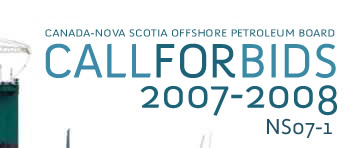
CANADA-NOVA SCOTIA OFFSHORE PETROLEUM BOARD


Offshore Health and Safety
Mandate
The Canada-Nova Scotia Offshore Petroleum Board (CNSOPB) is responsible for assuring that offshore oil and gas exploration and exploitation activities are conducted with due regard to safety. In this role, the CNSOPB ensures that all such activities are conducted in a manner in which identified risks are assessed and controlled to acceptable levels according to legal requirements and stakeholders concern.
Safety Plan Requirements
All operators must receive authorization from the CNSOPB prior to conducting any petroleum-related activity in the Nova Scotia offshore area. In support of an application for authorization, the operator is required to submit safety-related policies and procedures for Board review. An integral component of this submission is the Operator Safety Plan. The Safety Plan highlights critical requirements for safe operations in the offshore area. In most cases, the Safety Plan typically evolves as an integral component of a continuously improving Management System framework.
Particular attention is dedicated to reviewing submissions to ensure that the written policies, programs, and procedures address the following items:
- Authorities/command structure
- Risk assessment
- Facilities & equipment
- Operation & maintenance
- Training & qualifications
- Contingency planning
- Physical environmental monitoring
Authorization is only granted to an Operator if the Safety Plan is deemed acceptable by the Board.
Monitoring of Authorized Work and Activities
The CNSOPB monitors Operator compliance with legislative and regulatory requirements along with any conditions affixed to an authorization by way of site inspections and audits, documentation/record reviews, and interviews at all levels of the organization. The Board also conducts investigations into worker complaints, work refusals, accidents, spills and other significant incidents. Part III of the Accord Act delegates authority to the Chief Safety Officer (CSO), the Chief Conservation Officer (CCO), and safety and conservation officers, to conduct these types of activities.
Officers also have the ability to issue orders, including those to cease or limit activities in the event that an unacceptable risk is posed to worker health or safety. Non-compliance is generally addressed through a tiered process that motivates appropriate action from the operator; notwithstanding this, penalties for non-compliance can range up to $1-million per day plus time in jail.
For further information, contact:
Stuart Pinks
Manager, Health, Safety and Environment
Chief Safety Officer
Canada-Nova Scotia Offshore Petroleum Board
6th Floor TD Centre
1791 Barrington Street
Halifax N.S. B3J 3K9
CANADA
Telephone: (902) 422-5588 (24 hour)
Fax: (902) 422-1799